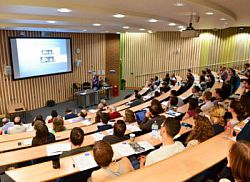Sussex Neuroscience event marks a successful first year
Around 120 researchers from the schools of Life Sciences, Psychology, Informatics and BSMS attended an event celebrating the achievements of Sussex Neuroscience over the past year.
The day included talks from faculty and postdoctoral fellows in mixed-discipline sessions that explored memory, vision and disorders of the brain and mind. The format encouraged cross-questioning am ong researchers with different approaches.
ong researchers with different approaches.
Six PhD students also took to the stage to deliver quick-fire talks which were particularly well received.
Adrian Bell was awarded a prize for his PhD work on handedness in locusts. He said: “The PhD student session was a fantastic opportunity to communicate my research; the lively discussion and feedback from the audience was really rewarding.” He added: “The prize was a great incentive for all of us and I was honoured to receive it.”
Guest speaker Professor Simon Laughlin FRS (Cambridge) spoke on the subject, ‘Ten ways to a more efficient brain’.
Emeritus Professor Paul Benjamin from the School of Life Sciences said: “This is the first time I can remember that neuroscientists from the different disciplines, with expertise in so many different techniques, have joined together in one room for an event like this; it is a very special occasion.”
Sussex was the first university in the UK to offer a degree in neuroscience, in 1970. Since that time, neuroscience has grown into one of the largest and most diverse scientific fields worldwide.
Sussex Neuroscience aims to enhance opportunities for collaboration and research output, and make improvements in the research infrastructure. The University is offering a new four-year PhD programme in Neuroscience from this September, which has already attracted applications from nearly 200 students internationally. Sussex Neuroscience is particularly keen to promote the experience of PhD students and early-career researchers and provide them with the best possible training.
Professor Lagnado said that, in addition to its primary academic objectives, the real goal was to make Sussex a really enjoyable place to do neuroscience.
